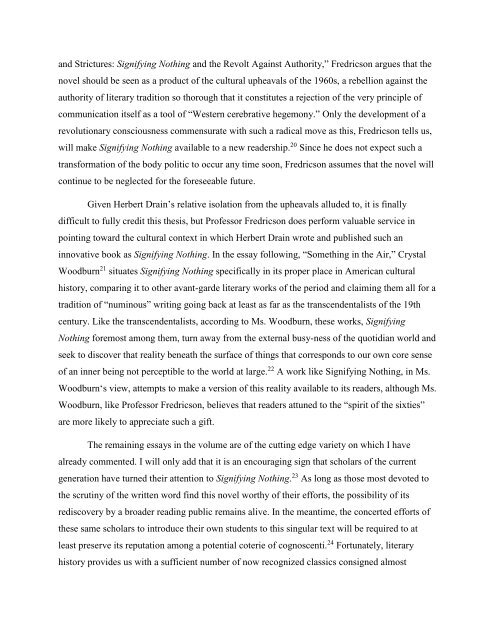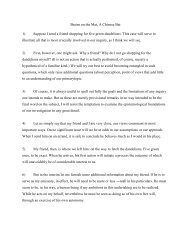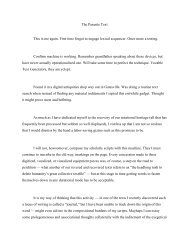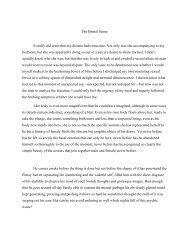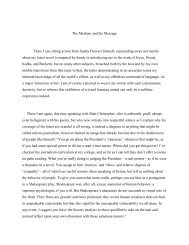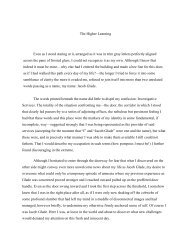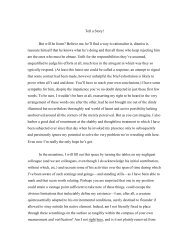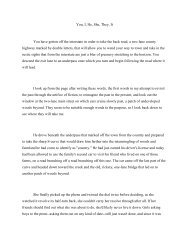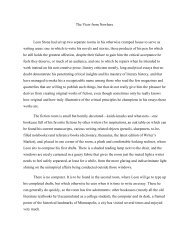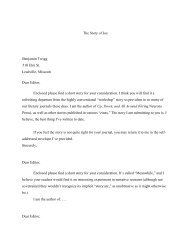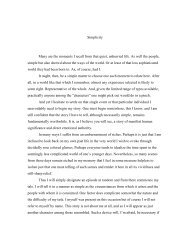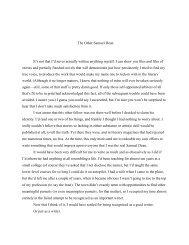Signifying Nothing
You also want an ePaper? Increase the reach of your titles
YUMPU automatically turns print PDFs into web optimized ePapers that Google loves.
and Strictures: <strong>Signifying</strong> <strong>Nothing</strong> and the Revolt Against Authority,” Fredricson argues that the<br />
novel should be seen as a product of the cultural upheavals of the 1960s, a rebellion against the<br />
authority of literary tradition so thorough that it constitutes a rejection of the very principle of<br />
communication itself as a tool of “Western cerebrative hegemony.” Only the development of a<br />
revolutionary consciousness commensurate with such a radical move as this, Fredricson tells us,<br />
will make <strong>Signifying</strong> <strong>Nothing</strong> available to a new readership. 20 Since he does not expect such a<br />
transformation of the body politic to occur any time soon, Fredricson assumes that the novel will<br />
continue to be neglected for the foreseeable future.<br />
Given Herbert Drain’s relative isolation from the upheavals alluded to, it is finally<br />
difficult to fully credit this thesis, but Professor Fredricson does perform valuable service in<br />
pointing toward the cultural context in which Herbert Drain wrote and published such an<br />
innovative book as <strong>Signifying</strong> <strong>Nothing</strong>. In the essay following, “Something in the Air,” Crystal<br />
Woodburn 21 situates <strong>Signifying</strong> <strong>Nothing</strong> specifically in its proper place in American cultural<br />
history, comparing it to other avant-garde literary works of the period and claiming them all for a<br />
tradition of “numinous” writing going back at least as far as the transcendentalists of the 19th<br />
century. Like the transcendentalists, according to Ms. Woodburn, these works, <strong>Signifying</strong><br />
<strong>Nothing</strong> foremost among them, turn away from the external busy-ness of the quotidian world and<br />
seek to discover that reality beneath the surface of things that corresponds to our own core sense<br />
of an inner being not perceptible to the world at large. 22 A work like <strong>Signifying</strong> <strong>Nothing</strong>, in Ms.<br />
Woodburn‘s view, attempts to make a version of this reality available to its readers, although Ms.<br />
Woodburn, like Professor Fredricson, believes that readers attuned to the “spirit of the sixties”<br />
are more likely to appreciate such a gift.<br />
The remaining essays in the volume are of the cutting edge variety on which I have<br />
already commented. I will only add that it is an encouraging sign that scholars of the current<br />
generation have turned their attention to <strong>Signifying</strong> <strong>Nothing</strong>. 23 As long as those most devoted to<br />
the scrutiny of the written word find this novel worthy of their efforts, the possibility of its<br />
rediscovery by a broader reading public remains alive. In the meantime, the concerted efforts of<br />
these same scholars to introduce their own students to this singular text will be required to at<br />
least preserve its reputation among a potential coterie of cognoscenti. 24 Fortunately, literary<br />
history provides us with a sufficient number of now recognized classics consigned almost


